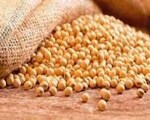Soya protein lowers total cholesterol and non-HDL (non-high-density lipoprotein) cholesterol significantly more than milk protein in patients with moderately high cholesterol levels.

Soya protein (SP) and low-fat dairy product consumption have been suggested to have cholesterol-lowering effects, although the responsible mechanisms are poorly understood. Non-HDL cholesterol has been shown to be a somewhat stronger predictor of cardiovascular disease and mortality risk than LDL cholesterol in population studies.
To evaluate the effects of an insoluble fraction of soya protein, compared to total milk proteins with high calcium content, on the fasting lipid profile, researchers followed men and women aged 18 to 79 years of age with elevated cholesterol, defined as fasting LDL-cholesterol concentrations of at least 100 mg/dL and less than 200 mg/dL while receiving no lipid altering therapy. The participants were asked to follow a specified diet throughout the study. Subjects that still met the inclusion criteria were then screened for their ability to lower their cholesterol in response to a bile acid binding drug. A majority of subjects responded and were then randomized to the test protein groups.
It was found that soya protein lowered non-HDL through a mechanism that does not involve increased bile acid excretion, but some yet to be determined mechanism. The soya protein that was used in this study was a relatively insoluble fraction of soya protein isolate that had been shown to lower blood cholesterol and increase bile acid excretion in stools in animals. The levels of isoflavones in the soya protein were lower than the average commercial soya protein isolate further supporting the notion that isoflavones do not play a role in the cholesterol lowering. The milk protein supplemented group also showed a modest cholesterol lowering. These results are supportive of the heart health claim for soya protein.
DoctorNDTV is the one stop site for all your health needs providing the most credible health information, health news and tips with expert advice on healthy living, diet plans, informative videos etc. You can get the most relevant and accurate info you need about health problems like diabetes, cancer, pregnancy, HIV and AIDS, weight loss and many other lifestyle diseases. We have a panel of over 350 experts who help us develop content by giving their valuable inputs and bringing to us the latest in the world of healthcare.












